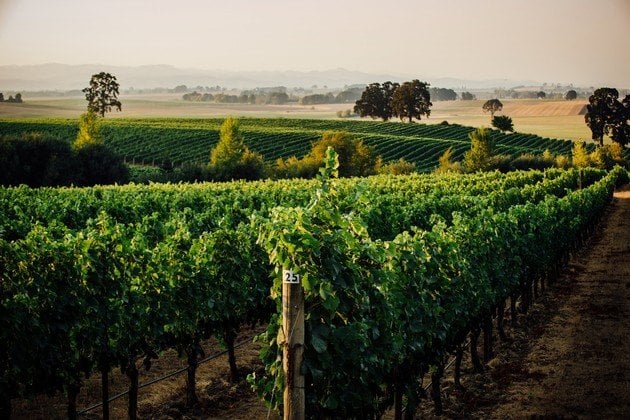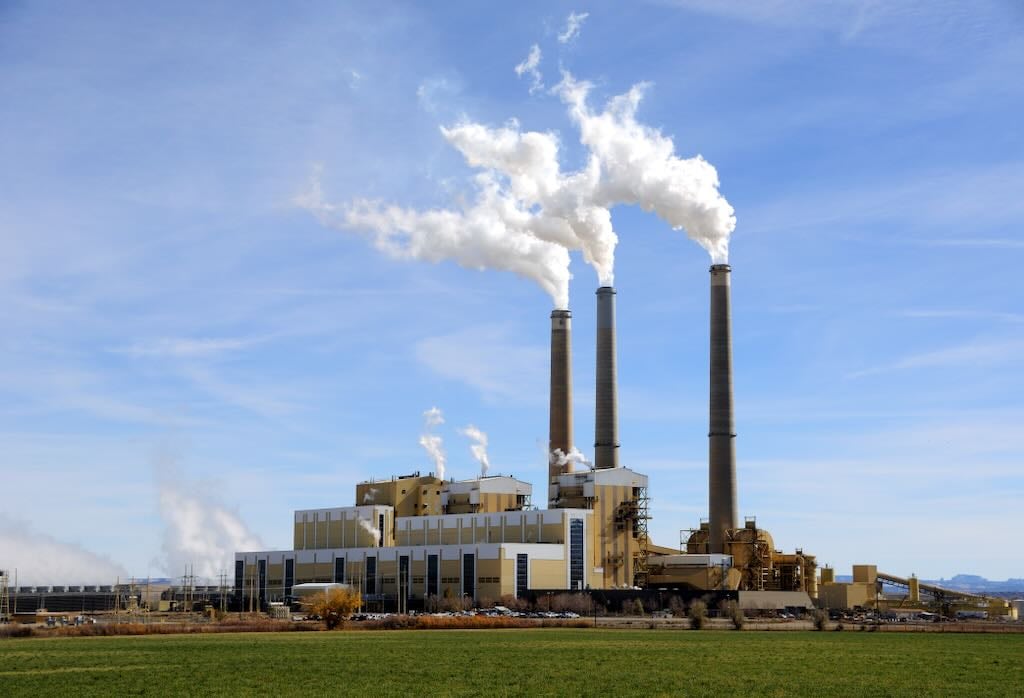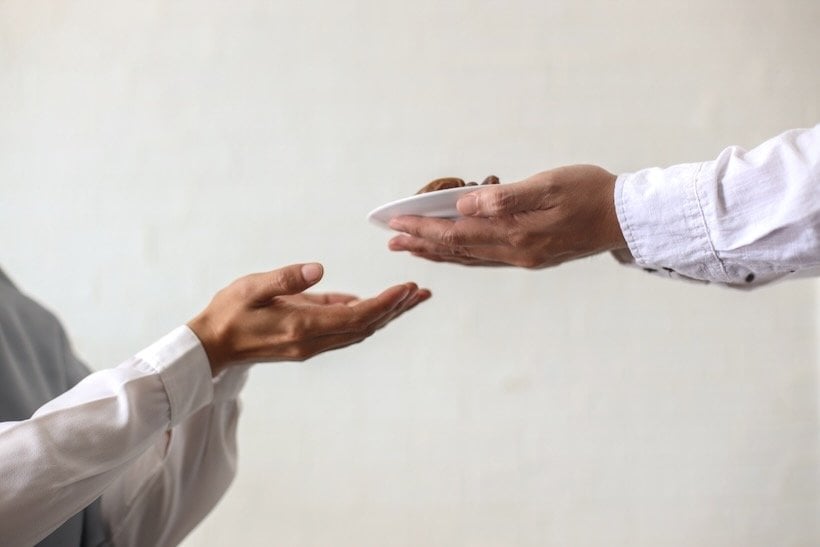This is the first in a series of six articles on building an “ethical wine cellar.” Greg Wacks and I have long felt that we need to help heal the soils, plants, animals and people that bring us the luxury of wine. Each article will bring the Worth reader cellar selections from experts in the world of organic, biodynamic and natural wine.
Ten years ago, asking a mainstream wine drinker if they had ever tried a “natural” wine would almost certainly have been met with confusion. Back then, all wine was inherently natural to most, given that it is made from grapes, grown in soil and nurtured by sunlight and rainwater—all-natural elements. Thankfully, we’re living in more sophisticated times and consumers are waking up to the joys of organic, sustainable, biodynamic and natural wines.

Today, what once was reserved for hipster neighborhoods, high-end restaurants and rustic corners of the world has now achieved mainstream status. Thanks to Instagram, Netflix docuseries, podcasts and other forms of media, we live in a world where the marginal “cult” wine drinkers of yesterday have moved more towards the center and thankfully, we’re all a little better off.
But before you run off to build your Ethical Cellar, let’s break down what it all means. The most important concept to grasp is that in the world of wine, there are two distinct camps: conventional vs. natural. While we will discuss natural winemaking and the various classifications, the phrase “natural wine” is really just a term used to distinguish wines made with minimal intervention versus wines that can be manipulated to achieve a desired outcome. Some of the most revered wines in the world are made with conventional methods yet some of the most vibrant and exciting are not. Below is a simple primer to provide an ethical foundation for your cellar and beyond.
At one end of the ethical spectrum are sustainable wines. These are the minor leagues of non-conventional wines. This means that the producer has chosen to employ certain practices in both the vineyard and the cellar that have reduced the environmental impact of traditional farming practices. Think of these wines as “highly considerate” to our environment, but some producers choose to focus on the bottom line.

When you factor in the need to make wines that are approachable for mainstream consumers, sustainable practices generally only pertain to production rather than the actual vinification process. That said, as grapes are grown, harvested and made into wine, there is a clear dedication to reduce environmental footprints. This includes commitments to renewable energy, to maintaining biodiversity, to basic recycling and to upcycling practices. As a practice, the term “sustainable wines” typically applies to how the wine is grown and refers less to how the wine is made. If you choose to buy sustainable wines, do your research. Something as simple as visiting a producer’s website and reading up on their overall philosophy or production practices can go a long way in educating yourself. You can (and should) seek out retailers who carry small producers committed to sustainable wines.
These wines are a great starting point on this journey, but the next stop is organic. Like all foods labeled “organic,” the definition varies from country to country. With wine, however, it is less complicated. Organic wine is wine made from organically grown grapes. One or more internationally recognized agencies (or in some countries a third party) must make this certification. All organic wines sold in the U.S. must have an organic certification on their labels. After pressing the grapes, things can get a bit dicey, but we will touch on that later when we address natural wines.
Since most of the damage to the earth and farmworkers, not to mention the birds, bees, worms, insects and other life forms, like yourself, takes place in the growing of the grapes…organic wine is a good thing for the planet. Most vintners who use organic grapes are unlikely to add harmful chemicals to their wine in the making.
Thus, the ethical choice of drinking organic wine really is a win for everyone. If you have ever seen farm workers picking grapes in hazmat suits to protect them and their families from exposure to dozens of toxic pesticides, herbicides or fungicides, you know why organic grapes are better.
Moving along on our ethical journey, we come to a pitstop full of buzzy catchphrases and evocative imagery called biodynamic. These wines speak more to the environment the winemaker creates and their commitment to both sustainable as well as organic practices. Created after World War I by an Austrian philosopher and self-proclaimed clairvoyant named Rudolf Steiner, biodynamic farming is as much about biology as it is about philosophy. It’s truly a way of life for many farmers and winemakers.
In biodynamic farming, a winemaker will create a self-contained environment in the field where the phrase “nothing in, nothing out” is the mantra. Think of this as a way to grow grapes, protect them from harm and produce vibrant results—without the use of chemicals or additives throughout the winemaking process. Instead, winemakers grow “cover crops” or plants and flowers that are used to attract certain animals and birds who are natural predators to insects which can cause an ecosystem harm.
Biodynamic wines differ from organic wines in that they take the entire ecosystem into consideration. To be certified under either of the two biodynamic wine certifications—Demeter (a globally recognized organization) and Biodyvin (primarily certifying wines from France)—vineyards must maintain exceptional soil health and vintners must time their planting schedules with lunar cycles to ensure the best agricultural health. Yes, it’s a bit of hocus pocus, but when you see a biodynamic vineyard, full of goats, butterflies and wildflowers, it’s a thing of beauty. In fact, unbeknownst to many consumers, some of the top producers, making some of the most expensive wines, are utilizing biodynamic techniques with incredible results.
At the very end of this ethical ramble are natural wines. Drinking wine that is “natural” has really exploded in the past few years. Natural wine is at the end of the sustainable, organic and biodynamic wine ethical continuum. The grapes must be organic or biodynamically sourced, nothing but indigenous yeast can be used, and nothing can be added to the fermenting/vinification process. For instance, natural wines have no added sulfites. By not adding this preservative, these wines tend to be less shelf stable. Think of natural wine as basically “just grapes.”
Because no chemical manipulation of the wine is allowed, natural wines vary greatly from region to region, varietal (type of grape—i.e., pinot noir, cabernet, etc.) to varietal and vintage to vintage. The inconstancy is part of its charm and a reaction to the absurd standardization of supermarket wines that the vast majority of the wine drinking world know and love.
Recently, there has been a movement toward a firm definition and certification of natural wine because, as of now, it has been the wine wild west. Without a legal definition of natural wines, consumers have been forced to rely on the good will of retailers to act as their proxies to the world of natural winemaking.
Needless to say, natural winemaking is the gold standard when considering an ethical cellar.
We hope this serves as a starting point to explore the world of non-conventional wines.
Below are some suggestions for an ethical cellar from David Lillie, co-founder of Chambers Street Wines in Manhattan—one of the first retailers to feature organic, biodynamic and natural wines.
Sparkling:
Marguet Père et Fils 2014 Champagne Extra Brut Grand Cru Ambonnay Rosé
We love biodynamic grower Benoît Marguet’s Champagnes for their combination of Ambonnay power and minerality, especially his excellent vintage-dated rosé. The palate is brightly mineral and structured, with a deep stoniness at its core within its layers of ripe red fruits and savory notes. This is natural Champagne and an absolute joy to drink. $74.99
Reds:
Bernard Baudry 2018 Chinon Les Grézeaux
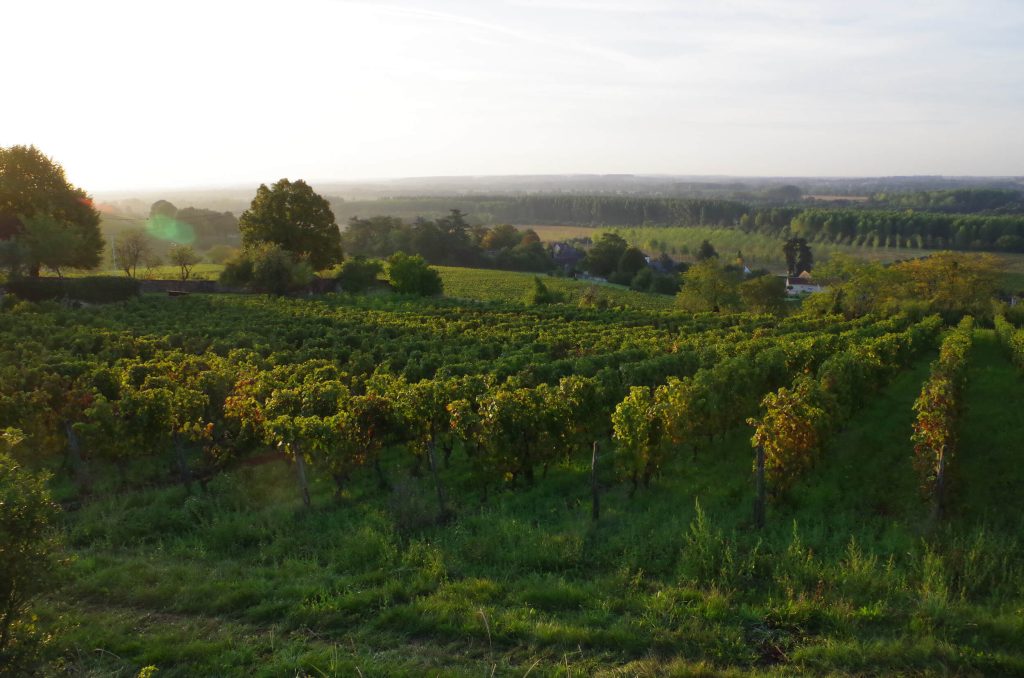
Organic farming, hand-harvesting, wild yeast fermentation with no added SO2, 10 mg/L added before bottling; Cabernet Franc on great terroir of gravel over limestone. Les Grézeaux always has an elegant silky texture and wonderful freshness, making it delicious as a young wine, combined with the ability to age beautifully for 20 years or more in a great vintage like 2018. $31.99
Jean-Claude Rateau 2018 Beaune Les Prévoles
Jean-Claude Rateau’s domain has been biodynamic since 1979, the first in Burgundy, and produces lovely, light-bodied, old-fashioned wines. The 2018 Beaune Les Prévoles shows beautiful aromas of tart cherry and red currant fruit with rose, orange peel and earth. The palate is chalky, ripe and sapid, while remaining light and fresh with earthy cherry and raspberry liqueur. Drink this delicious Burgundy over the next five to eight years. $38.99
Domaine de l’Ecu 2018 Vin de France “Aeterno” Syrah
Fred Niger made this gorgeous Syrah with grapes from David Reynaud in Crozes-Hermitage (old vines on “les Croix”) using biodynamic farming, vinified and bottled with zero additives, and aged for nine months in amphora of 400 and 500 liters—less than 200 cases were produced. Nose marked by smoky notes of ripe black fruits, blueberry, violet, white pepper. A supple attack leading to a powerful wine, full palate, opulent and massive, balanced by tannins that are fine and delicate. $47.99
Trediberri 2015 Barolo Rocche dell’Annuziata
This wine has great color…by which I mean, for Nebbiolo, not very dark; in fact, somewhat pale, but with bright cranberry tones—a sure sign that it’s not too extracted. That visual translucence applies to the palate too, a surprisingly graceful wine for Rocche dell’Annuziata; rich with fruit but without any fat and very long. A great candidate for long term aging. Organic farming, low sulfur. $84.99
Day Wines 2016 Willamette Valley Johan Vineyard Pinot Noir
The excellent farming from this Demeter-certified vineyard shows in every wine I have tasted from there, but this bottling from Brianne Day made with indigenous yeasts really lets the terroir shine. Day Wines sources from some of the best vineyards in Oregon, all of whom practice biodynamic or organic farming, and Brianne is committed to showcasing these hard-working growers with her low-intervention wines. $42.99
La Senda 2018 Bierzo Tinto “1984”
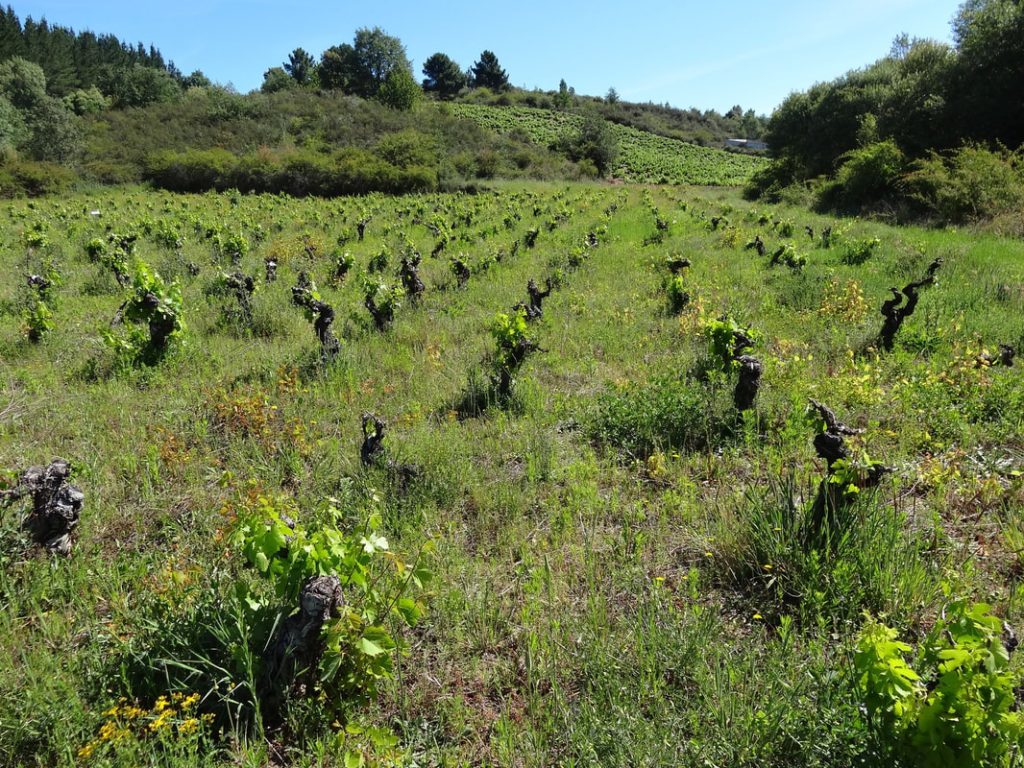
Diego Losada is making natural wines in Bierzo: rehabilitating very old plots of indigenous grape varieties, farming them organically and vinifying them without additives. This wine is a great example of skilled natural winemaking and a testament to the hard work that goes into organic agriculture. $19.99
Whites:
Claus Preisinger 2018 Burgenland Kalkundkiesel
The name Kalkundkiesel designates the use of sites that are rich in chalk (kalk) and pebbles (kiesel). The blend is 60 percent Weissburgunder, 30 percent Grüner Veltliner and 10 percent Chardonnay produced using biodynamic farming. The fermentation occurs with the skins, and then the wine is aged for six months in neutral oak barrels on the lees. $27.99
Monterosso 2018 Etna Bianco Crater
Made from organically farmed Carricante grapes from a single vineyard inside the crater that sits towards the top of Monte Rosso. The vines here average 70 years old. On the nose, there are essences of smoke, light spices, lemon peel and tea leaves. The palate is muscular with a depth of lemon, pear, apricot and pepper flavors. $38.99
Domaine de la Pépière Château Thébaud Muscadet Sèvre et Maine Clos des Morines
This gorgeous Muscadet comes from old vines on a beautiful vineyard with great terroir sloping down towards the river Maine. Organic farming, hand harvesting, wild yeast fermentation followed by 42 months aging on the lees. Drink now with shellfish, cod, sole and roast chicken or cellar for 20 years or more. $27.99
Porter Creek 2016 Russian River Valley George’s Hill Chardonnay Old Vine
Sourced from the estate’s George’s Hill vineyard, this biodynamically farmed site produces some of the most exciting Chardonnay in the entire Russian River. This wine is big on texture and has great aromatic power, with notes of green apple, almond and darker mineral, oily, almost saline notes, and will continue to improve in the cellar for at least 10 years. $41.99
Rosé:
Nikalas Marani 2018 Kakheti (Georgia) Budeshuri Saperavi Rosé
Zurab Mgvdliashvili, owner and winemaker of Nikalas Marani, is also the president of Georgia’s Natural Wine Association and has been farming a few hectares of vines in the Kakheti Valley without any chemicals, making his wine in the traditional qvevri (large clay amphora dug into the earth) without the use of sulfur. This 2018 is quite wild, with deep red berry notes, wild tart cherry, ripe strawberry, strawberry seeds, ripe watermelon, red plum, as well as a slightly salty aspect, something akin to umeboshi (pickled Japanese plums). A fascinating wine and very fun to drink. $28.99
Les Foulards Rouges 2019 Vin de France La Soif du Mal Rosé
Jean-François Nicq is a leader in natural wine production in southern France. His Les Foulards Rouges “Soif du Mal” Rosé is made with Syrah and Carignan grown on decomposed granite soils giving yields of 30 hl/ha. Direct press, low temperature fermentation with wild yeasts with no added SO2, aging in five-year-old foudres. Delicate and delicious! $26.99
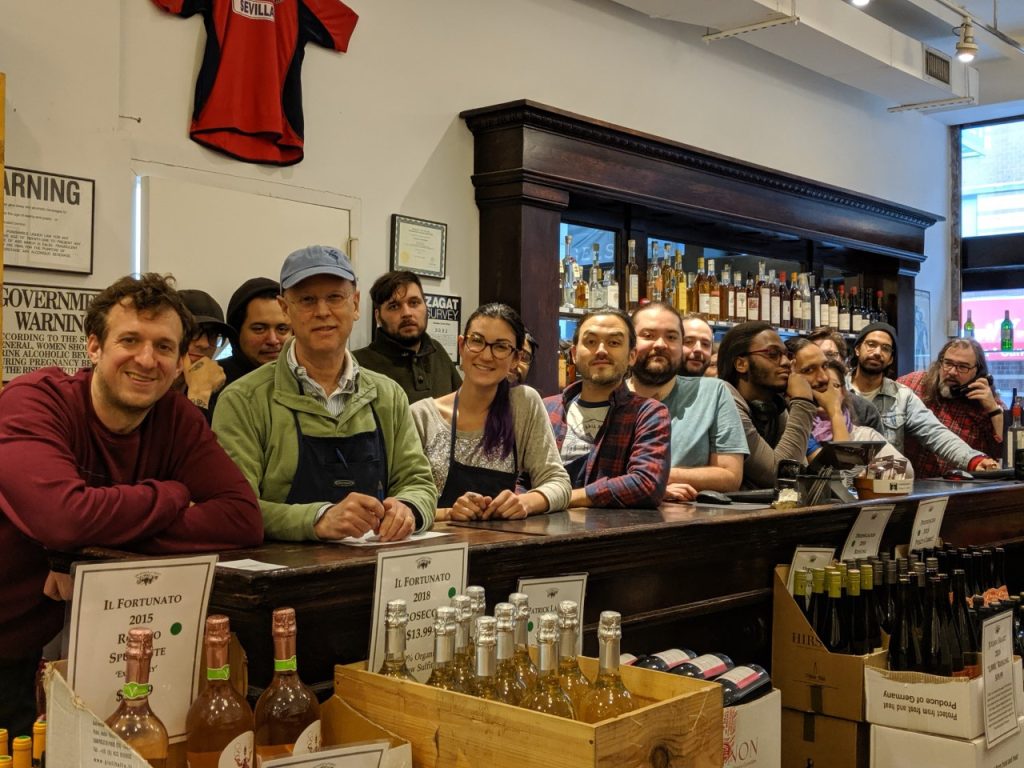
Chambers Street Wines
The shop opened in June 2001, as the product of David Lillie and Jamie Wolff’s idea that America “might support a shop that indulged their love for naturally made wines from artisanal small producers.” They are proud to support the growing number of winemakers who are passionate about the health of their soils, their employees and their customers, producing brilliant wines with minimal or zero additives which are a joy to drink. Many of their selections are imported solely for Chambers Street, allowing them to offer these unique wines at very reasonable prices. They are partial to wines from the Loire Valley and always have a wide selection of mature wines from Piedmont.

